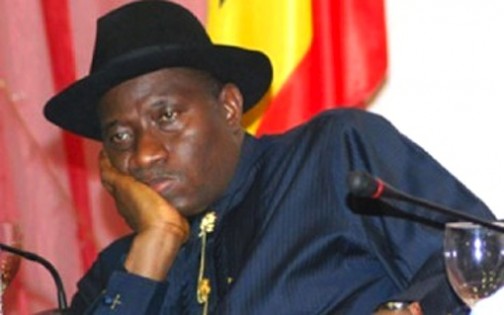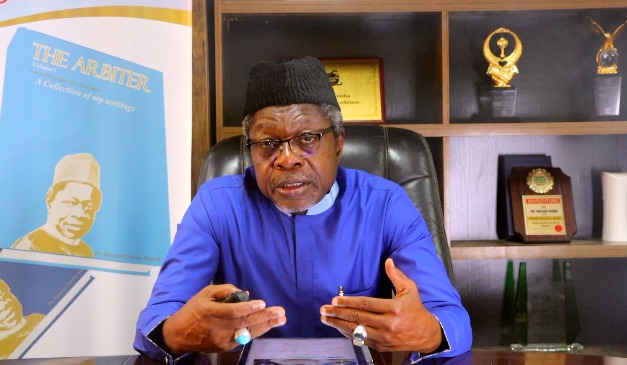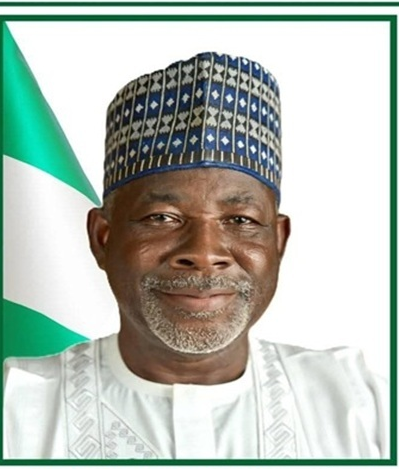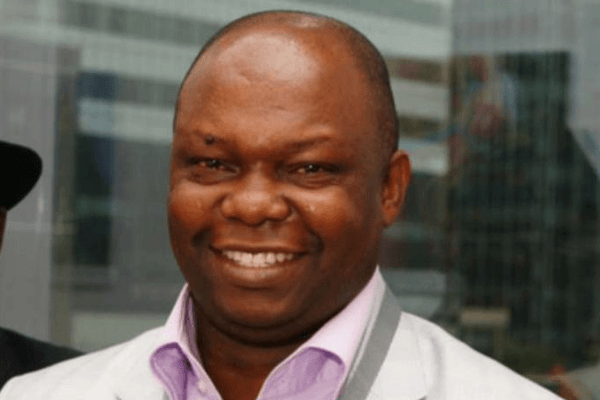Last Wednesday, Muhammadu Buhari and his newfound friend, Goodluck Ebele Jonathan, locked each other inside the sacristy of the Nigerian presidential Villa, christened Aso Rock. When they came out afterwards, both wore the visage of 3-year old Syrian girl, Salwa and Cuckold, a 1997 book written by Indian, Kiran Nagarkar. Cuckold, a historical novel patterned after the narrative of Maharaj Kumar, may in a way explain the recent hot and adulterous romance between Jonathan and Buhari.
In the book, Kumar had attempted to win his wife, Mira’s affections in the midst of a ravaging war in the land. Set in the Rajput kingdom of Mewar of the 16th century, a wife named Mirabai refuses to see Mewar prince, Bhoj Raj, as her husband but thinks instead of Lord Krishna as her hubby. Originally derived from the bird called cuckoo which has the tendency of laying its eggs in other birds’ nests, right from the Middle Ages, cuckolding became an allusion to a man or woman who has sex with an already married partner, sometimes out of wedlock and at other times, as a fetish where some married partners derive voyeuristic joy in watching their spouse engage in sexual liaison with another.
In 2010, Salwa caught the headlines after a trending video recording of her playing a game and laughing rambunctiously as warplanes dropped bombs very close to her home in Idlib, Syria. Idlib was Syria’s final major rebel-held stronghold region where Turkish-backed rebels and Syrian government forces fought in an atrocious battle to destroy each other. The world was aghast at what was perceived as Salwa’s emotion-dead response to destruction and death.
It was later that her father, Abdullah Mohammad, told the world that he taught Salwa wartime laughter; that, rather than being scared at the sight and sound of deafening, frightening and destructive air strikes, she should deaden her fright with laughter, as a counterpoise and coping mechanism. He purchased fireworks for her and got her immersed in its frightening noise. With this, Abdullah taught Salwa that both – bombs and fireworks – were synonymous and loud noises, rather than creating fright, could be funny. It helped Salwa stay calm as cannons and bombs wreaked their havocs.
Dressed resplendently in blue colour traditional Ijaw attire, with a black bowler hat to match as picture from the presidency depicts, Jonathan and Buhari both cut the image of two unequally yoked afflictions besieging a single household. Traditional Yoruba call such Ile njo, ole nja – a household on fire and at the same time invaded by burglars – which keep onlookers guessing as to the depth of the unwanted guests’ incestuous relationship. Buhari was also dressed in a cocaine-white babanriga and cap to match. They both saluted each other in the COVID-19 elbow-jamming manner. Barely disguised but hidden behind their visage was a cheerfulness that made them look like a girl who titivates her hair with sequins on her first date.
What is the relationship between laughter and war? Put differently, is laughter permissible at times of war, when there is so much death and destruction? In all histories of war, this unequally yoked binary has always maintained an uneasy relationship. Kaiser, the German imperial power in the First World War, would not hear of such incestuous relationship between war and laughter. In a telegram to the Mayor of Berlin during the war, he demanded seriousness and self-constraints. Indeed, the Kaiser and German military of WW1 pronounced urban laughter a taboo during the war.
The bleakness of war should make impossible all joy, they said. What manner of amusement can there be when death and suffering are going on at the war front? How can humour be legitimate in the city in times of war? This was why Carl Braun, also known as Carl Hobner, ran into trouble with the Berlin police in October, 1914 when he humorously mimicked German generals and dignitaries while the war was going on. For the Kaiser, pubs, amusement parks, theatres and cinemas should all be closed in war time.
That was not for Jonathan and his ‘fiend,’ the president. Judging by the discourses on parade in the political arena, Buhari and Jonathan, two hitherto sworn political enemies, must have come together to discuss 2023. They have held a couple of such. On the superficial, however, Jonathan, ECOWAS’ special envoy, had struttled into his former abode at the presidential palace to discuss the crises-ridden West-African country of Mali, with Buhari. But pray, are Mali’s crises more than Nigeria’s and who is the Nigerian problem being reported to?
But why would Buhari and Jonathan be discussing 2023 when there is war in Nigeria? Make no mistake about it: Nigeria is in a time of war. Shrouded official figures of Boko Haram killings of Nigerians and their soldiers number hundreds; bandits slaughter scores daily in the Northwest; farmers cannot go to till the land for fear of being strafed to death by bandits’ AK-47 bullets; in Niger State, Boko Haram has ceded Nigeria’s territory to itself, pegging girls’ marriageable age at 12.
Nigeria is at war. Her economy, even at the thick of the Biafran war, possessed more verve than the economy under Buhari. The Nigerian Naira is periodically sighted at red light districts, in undisguised dalliance with the Zimbabwean dollar and Congolese Franc, the three barely clad and smiling seductively like coquettes of nil worth that they are. Hopelessness had never been this proximate to more than half of Nigerians in almost a century. Should Nigerian leaders then be exchanging mutual political conviviality, like imperial powers partitioning Africa at the 1884 scramble for the black continent, ceding out and receiving presidential power, in this time of war?
With the 2023 election in the neighbourhood of a little over 12 months ahead now, permutations, alignments and projections are being shuffled like stock traders do on the floor of the stock exchange. Grapevines are rife with claims that President Jonathan is being lured by the rank of his old political adversaries to run for the Nigerian presidency again. On the face value, this proposition sounds very stupid, illogical and otiose. Why would those who ganged up to make the Ijaw-born ex-president’s name worthless a few years ago, be the same people he is embroiled in playing tombola with today?
Rivers State governor, Nyesom Wike, took the dalliance between Buhari and Jonathan beyond hearsay when he warned Jonathan recently not to yield to the pressure to contest the presidency under the APC, same party that nailed his coffin in 2015. Speaking to the BBC, he said, “If I see the former President, I will tell him what I heard. I will tell him, don’t go anywhere because these people want to destroy your reputation.”
The calculation is said to be one of the dirty power gimmicks of the North to swiftly return to power if it eventually gets supplanted by a southerner in 2023. Surveying the horizon with a clean but selfish toothcomb, Ahmadu Bello’s progenies were said to have discovered, to their chagrin, that unless someone constitutionally barred from a second term was sneaked into Aso Rock, their fated birthright of Nigeria’s presidency could suffer on the sidelines for another eight grueling years. The most fitting sucker who can act as stand-in and take the bullet for such infernal project was a man the same Northern elders had tar-brushed as clueless, feckless and a recklessly irredeemable drunk whose life was incomplete without shots of liquor.
With the connivance of Ahmed Bola Tinubu’s octopodal media machine, by the time Jonathan was going into the 2015 presidential election, the Buhari/Tinubu machine had mortally damaged his brand, rendering the name Jonathan as worthless as a degree from Trump University. The theatrics of dollar-baiting Yoruba traditional rulers who pointed effete traditional insignia at Jonathan’s head, with him kneeling down in their midst, ostensibly for traditional invocation for his success at the polls, was by them a mere alupaida – fraudulent stunt. His wife, Patience, was visited the most visceral denigration in history, so much that she had less worth than a horoscope.
Today, other than a recent unexplained taciturnity she recoiled into, there was no embarrassing infraction committed by Jonathan’s wife that Buhari’s voluble Captain of Zi Oza Room has not. But, is it cluelessness, lust for power or outright unintelligence that will make a man, as the Yoruba will say, return to bid a hostile host good evening, in the same unwelcoming home where he was booed out and forced to say good night awhile ago?
Aside the fact that the Nigerian politician’s heart is reputed to be painted in red colour like a mass of scarlet berries, these politicians are certified gang of brand conmen. We were living witnesses to how then General Buhari, who we all knew for his intolerance to voices of dissent, with an Antarctica-like frozen views on national development, suddenly became branded as a born-again democrat. They put on him borrowed robes, forced him to wear agbada and Igbo Ishiagu, apparels of two people he never disguised his disdain for, while forcing him to dance to the adulterous music of Wasiu Ayinde on the campaign rostrum. Here was a man Nasir el-Rufai, in 2010, referred to as “an almost-70 principal (who) should retire,” a man he said was “perpetually unelectable” and who suddenly got deodorized and presented to the people as Angel Gabriel. El-Rufai, in that same statement, warned Nigerians that “a Buhari, the new Democrat, tolerant of views different from his own, is yet to evolve.”
As we were wondering how APC, PDP will navigate us into this potentially doomed Jonathan mis-presidency, another artful dodger climbed up the rostrum. Serial presidential aspirant, Turakin Adamawa, Atiku Abubakar, last week dismissed the zoning of presidential ticket debate as response to the current Nigerian leadership crisis. He made this known at the 94th National Executive Committee (NEC) of the PDP held last Thursday. “Where the president comes from has never been the problem of Nigeria, neither will it be the solution. There is no such thing as the president from Southern Nigeria or president from Northern Nigeria. There is only one president from Nigeria, by Nigeria and for Nigeria,” he said.
In the ecology of Yoruba’s dismissive estimation of people who fail to dispense with old analogies and embrace recent discourses, such persons are seen as being busy engaged with culinary masturbation by eating an agbonrin esin – one-year old venison. With this thesis that is irrelevant to the reality of today, Abubakar is apparently devouring this old, uninspiring agbonrin esin. In an earlier piece, I prophesied that Buhari may be the last Nigerian president. I didn’t mean that Nigeria may not exist, post-2023 but that we can never have a president who will think Nigerian or a Nigerian thinking at the presidency any longer. Buhari has so mortally destroyed that thesis of “where the president comes from has never been the problem of Nigeria” with his unexampled nepotism in office, so much that where the president comes from matters greatly now. In any case, shouldn’t Nigeria have now moved out of this perennial Atiku Abubakar presidential hustling to something more ennobling?
If you add this to Jonathan and Buhari’s embarrassing cuckolding in this time of war, you will have the complete picture of a Nigerian circus that has just begun yet another season of our anomie.





